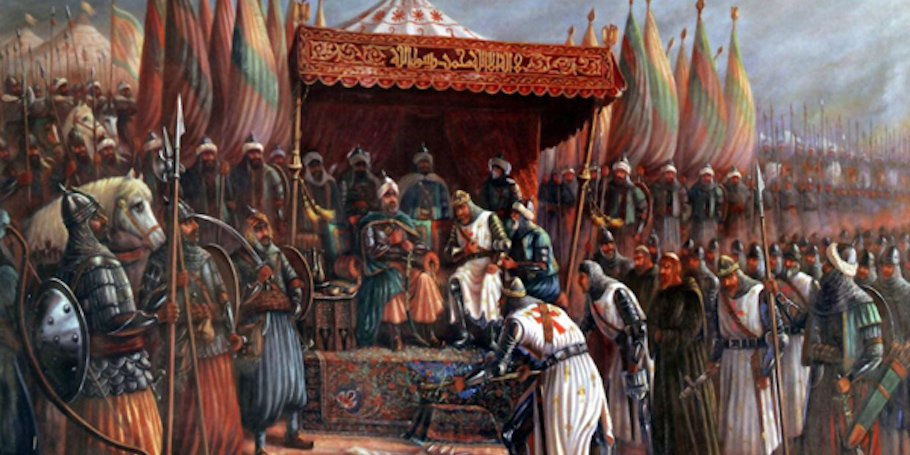Monday, January 11th 2016

Salahuddin Ayyubi, popularly known in the West as Saladin, was a courageous and brilliant Muslim leader during the 12th century. His firm foundation in the religion and its prime values, leading to his commitment to the Islamic cause, enabled him to accomplish great things.
His Ayyubid Empire united Egypt and Syria. Above all, he played an instrumental role in turning the tide against the Crusaders by successfully reclaiming Jerusalem and earned a name for himself in the annals of both Muslim and Western history.
Saladin was born in 1137 AD in Tikrit, Iraq, and studied the Quran and theology along with astronomy, mathematics, and law. He joined the military as a young man and was ably trained by his uncle Asad-al-Din Shirkoh, a commander of the Zengid Dynasty. Saladin’s impressive performance in his early battles enabled him to take on leading responsibilities during military campaigns.
His rise from a soldier to the King of Egypt and Syria was the result of both cleverly executed tactics and advantageous circumstances. He held key posts in Egypt, enabling him to consolidate power and overthrow the Fatimids. Syria, at the time, was ruled by the Zengids; when the Zengid ruler unexpectedly died, leaving an underage successor, the road was eventually cleared for Saladin to capture Syria. During his reign, Saladin built many schools, hospitals, and institutions in his quest for intellectual and civic achievements. He was also determined to bring justice, peace, and prosperity to those within his domain.
Saladin reconquered Jerusalem from Crusaders
Salahuddin is best known for repelling the Crusaders and reconquering Jerusalem. He defeated and decimated large numbers of the Crusaders in the decisive Battle of Hattin in July, 1187. On his way to Jerusalem, Saladin conquered almost every Crusader city. After a siege, Jerusalem was handed over to him in October of the same year. Subsequent efforts by the Crusaders to win back Jerusalem were resisted until they finally gave up and retreated homewards.
Although one would expect Saladin to be hated among the Crusader nations, he became one of the most esteemed Muslim figures of the medieval Islamic world because of the generosity he displayed towards the Christians despite the brutality Muslims had endured at the hands of the Crusaders. When the Christians had overtaken Jerusalem during the very first Crusade, they carried out mass atrocities and killings, creating a bloodbath in which the Muslim residents were the most prominent targets, as graphically documented in the PBS series Islam: Empire of Faith. In the words of the chronicler of Crusades, Raymond of Agiles, the massacre was so extensive that the Crusaders “rode in blood up to their knees and bridle reins.”
When Saladin retook Jerusalem, the Christians waited for a similar onslaught. However, Salahuddin not only spared the Christians but treated them honorably, allowing those who wished to leave to do so in peace, and for those who wished to stay to do so in harmony. Truly, he was a living example of the tolerant, progressive, and inclusive faith which was so dear to his heart. By showing restraint and peaceful treatment, Salahuddin was upholding the central tenets of Islam such as freedom of religion and protection of non-Muslims.
The chivalry of Saladin
Moreover, his chivalrous conduct toward King Richard I, and the mutual respect which ensued despite their warring roles, won him further accolades in quarters that could not bring themselves to despise him. “When Richard falls sick at the siege of Acre in 1192, Saladin not only sends his personal physician Maimonides over to treat him, he sends ice to help him fight the fevers and certain healing fruits. When Richard’s horse is killed during battle, and the English king finds himself on foot facing the entire Muslim army, the Muslims let him walk by their entire phalanx without attacking. Later, Saladin sends him two fresh mounts so he will not be at a disadvantage,” wrote Michael Hamilton Morgan in Lost History.
According to the French historian, Rene Grousset,
“It is equally true that Saladin’s generosity, his piety, devoid of fanaticism, that flower of liberality and courtesy, which had been the model of our old chroniclers, won him no less popularity in Frankish Syria than in the lands of Islam.”
Salahuddin Ayyubi died in 1193 AD at the age of 56. Although he was at the helm of a vast empire stretching from Egypt to Syria, he himself owned very little. At the time of his death, his property and assets included a horse and money which was not sufficient even to bury him. He had devoted his entire life to the service of Islam and his subjects, avoiding the pomp and splendor which often distract rulers. Indeed, he was the epitome of a true hero and a devoted Muslim.

Saladin and Guy of Lusignan after Battle of Hattin




